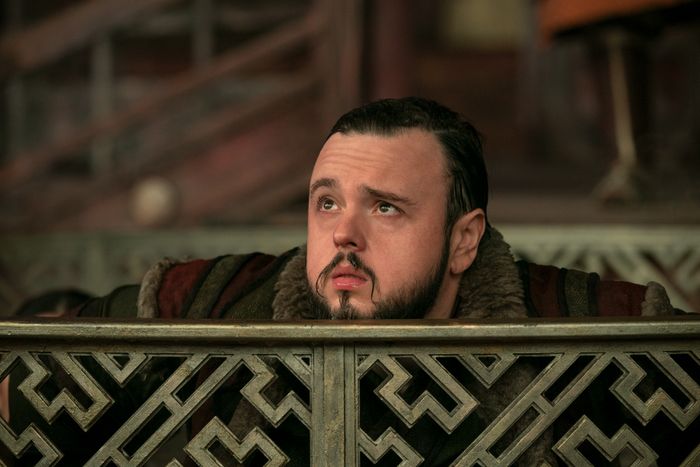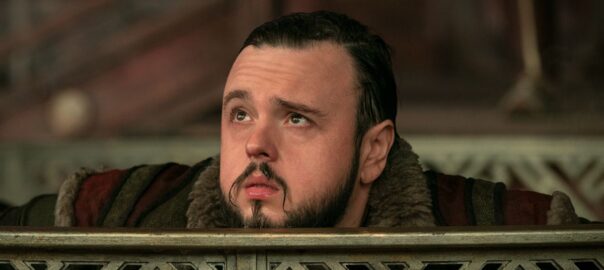[ad_1]

“As a device and a plot point, I completely get it, and as an acting challenge, I welcomed it.”
Photo: Ed Miller/Netflix
Spoilers ahead for 3 Body Problem.
Despite being known for playing bookish geeks in genre fare, most famously Samwell Tarly in Game of Thrones, John Bradley is not actually into that sort of stuff. He wasn’t at all familiar with The Three-Body Problem, the seminal Chinese sci-fi novel that Netflix has adapted into a swanky new series, 3 Body Problem.
“I was big into sci-fi and fantasy as a kid, but I kind of left it behind when I got into my teens and got into football, mainly, and sport,” Bradley says. “My interest kind of trickled away.”
It’s somewhat fitting, then, that his character in the series, which reunites him with Game of Thrones showrunners David Benioff and D.B. Weiss, isn’t your typical nerd. Jack Rooney is a boisterous Oxford dropout who made a killing with a snack-food startup rather than pursuing physics like his four friends. (You don’t get on the cover of Cigar Aficionado, like Jack does, in egg-headed academia.) Jack nonetheless gets involved when scientists around the world start dying, the beginning of a conspiracy that heralds an alien invasion. And, after making a principled stand to reject an offer to ally with the aliens, Jack meets a grisly, unexpected end in the third episode — the first major death of the series.
Bradley recalls that when he did learn about The Three-Body Problem, and how acclaimed and complex the book was, he was instantly intrigued. “As soon as you say that you’re making an adaptation of it, people are filled with a sense of admiration, curiosity, and a bit of ‘all right, well … good luck,’” he says.
Jack, like most of 3 Body Problem’s core characters, is an invention for the series, which transposes most of the action from China to the U.K. Despite this, Bradley says Benioff and Weiss, along with the third showrunner, Alexander Woo, went to great lengths to preserve the integrity of the original. “It wasn’t a case of taking it and doing whatever we wanted with it,” Bradley says. “We were very rooted in a sense of respect.” Even so, there are lots of new twists and turns in the Netflix series, including some major ones in the first three episodes involving Jack.
Jack Rooney seems like an inversion of Sam Tarly in some ways but also a natural evolution in others.
Dan Weiss and David Benioff called me up and said, “We’re doing this new adaptation and we’ve written you a character who is going to be kind of unlike anything you’ve ever played before and closer to your own character.” They knew me for a decade filming Game of Thrones, so they kind of got a sense of what I was like as a person. Dan did an interview where he said that halfway through filming, they realized I was diametrically opposed to Sam. That’s a compliment — until you remember that Sam was really nice and kind and loyal.
There are similarities between Sam and Jack in terms of intelligence and natural curiosity. But Jack’s just got confidence in his own opinions and what he believes to be true. Sam had that as well, but Jack’s got the bravery and self-assuredness to be able to express his opinions much more pugnaciously and confidently than Sam ever did. If Sam had Jack’s self-confidence, then that whole problem would’ve been solved a lot sooner in Game of Thrones.
For a long time, Sam and other characters I’ve played have had self-esteem issues and confidence issues. They’re always kind of the browbeaten underdog. It was nice to be able to liberate myself from that and take away those psychological boundaries and just play someone who is completely at ease with themselves. Jack is a big part of me and it’s a part of me that David and Dan spotted, but it’s the part of me that I wish I could be all the time. There is self-doubt in there as well that I was able to expel through Jack.
Did you want to — and were you allowed to — keep the giant Cigar Aficionado cover printout with Jack on it?
They offered me that, actually. And I did want it, in a way, but I don’t think I would have displayed it. I would have kept it rolled up in the closet. As a single man, you never know what’s going to happen if you date someone and it goes well and you bring them back to your house for the first time and there’s a 50-foot-high photograph of yourself with a cigar. They may not see that that was an ironic thing.
What was it like teaming up with Benioff and Weiss again?
If it was anybody else, I would have probably asked more questions. I’d done Game of Thrones for a decade and then did a couple of movies; I wasn’t really desperate to get into a long-running TV show again. But as soon as they said the part was written for me and that they thought I’d have a great time with it, it was the easiest yes I’ll probably ever have in my career. I didn’t even really have to think about it.
As I learned what the adaptation was and what they were planning to do with it, my respect for them — as if it could get any higher — only increased because I realized that they were not taking it easy on themselves for their next thing after Game of Thrones. They’re even more ambitious and the stakes are even higher. I was just desperate to be a part of it and flattered that they asked.
Did the negative response to the latter seasons of Game of Thrones put any pressure on them, or by extension you?
I think it’s hard for them to completely take that out of the back of their minds. For us as well, it does sort of trickle down but only in a positive way, really. It wasn’t that it knocked our confidence or made us doubt anything, it just made us more determined to make 3 Body Problem as good as it could possibly be. We just want this to be the second act of their careers and hope that people give it the chance that they deserve.
Were you at all miffed that, after surviving eight seasons of Game of Thrones, Benioff and Weiss killed you off in episode three this time?
Initially, I was just a bit upset that I couldn’t stay with that character for longer. But, over the course of Game of Thrones, so many of the great moments that people remember are those big impactful deaths, and I never got it in Game of Thrones. You think about the Red Wedding or Joffrey dying, the way they handle those shock deaths — they do it better than anybody else. To finally get one, I was kind of thrilled. And it was flattering as well. They’d given me this character that’s only in three episodes, and they trust me as a performer. For somebody who is not around that long, my job is to make people miss him when he’s gone.
I think the death does have an effect on the rest of the season. It feels like a tonal change. It becomes slightly less fun, the stakes go slightly higher, and the threat becomes bigger. As a device and a plot point, I completely get it, and as an acting challenge, I welcomed it.
Why do you think Jack made that choice to walk away from Tatiana? Of all of the Oxford Five, he’s kind of the one who “sold out” and made a mint on snacks rather than pursuing science or teaching.
That’s quite consistent. He just goes on his gut instinct and he won’t do anything that people say he should do. He won’t be influenced by people. There’s a parallel in leaving science behind and plowing his own furrow and him not believing what people tell him. That shows remarkable strength in him and faith in his own decision-making.
How much of a loss is Jack for the Earth’s cause? What untapped potential was there?
In Jack, there’s a really sharp sense of critical thinking. He’s a very useful voice to have around any table because he’s very good at undercutting all of the science talk and bringing it back down to earth. That he took all of this highfalutin physical theory and made potato chips out of it goes to show that he does have one foot firmly on the ground. He’s very good at puncturing people’s ideas and finding out what doesn’t work. Having that slightly dissenting voice is always helpful.
This might be above your pay grade as an actor, but does part of you wish that 3 Body Problem wasn’t getting a binge release? Part of what made Game of Thrones so great was that people had a week to discuss each episode. When all the episodes drop at once, people can’t spend a week saying “Oh my God, Jack died!” together — they just fire up episode four.
I do miss weekly episodic TV. It’s still out there. With something like Succession, for example, you become part of the conversation for ten weeks. Whereas when everybody watches a show in a few days or a week, you burn incredibly brightly but for a very short amount of time.
There was talk, I believe — I don’t think it was seriously considered — of doing 3 Body Problem in two blocks of four. But I think that once that narrative ball gets rolling, people are going to be so curious about it that the conversation isn’t going to end when people stop watching it. It’s capable of becoming a movement in its own right. I’m a traditionalist. The idea of everybody across the world experiencing these exact emotions at exactly the same time — that’s a lovely thing. But you just have to sort of not stand in the way of progress and accept that that’s the way things are now.
What would you do if you learned aliens were invading in 400 years?
I’d tell people to start to develop a sense of appeasement. As soon as we think about aliens, we automatically cast them as the enemy. We have this really weird self-preservational thing if someone’s not exactly like us. For the next 400 years, let’s just start to get rid of all this combative energy. Be more accepting of them and maybe, just maybe, we can find a way through.
Is that how Jack would have responded had he lived long enough to be part of the Planetary Defense Council?
Oh, Jack would want to go all guns blazin’. Jack’s got a kind of difficult and quite interesting relationship even with his best friends, so I think Jack would get his fighting irons on and would start swinging.
This interview has been edited for length and clarity.
[ad_2]
Source link
